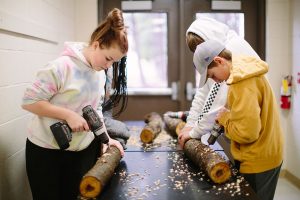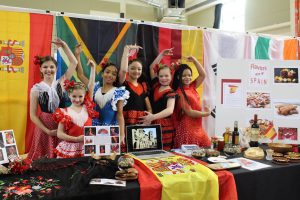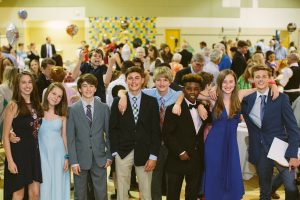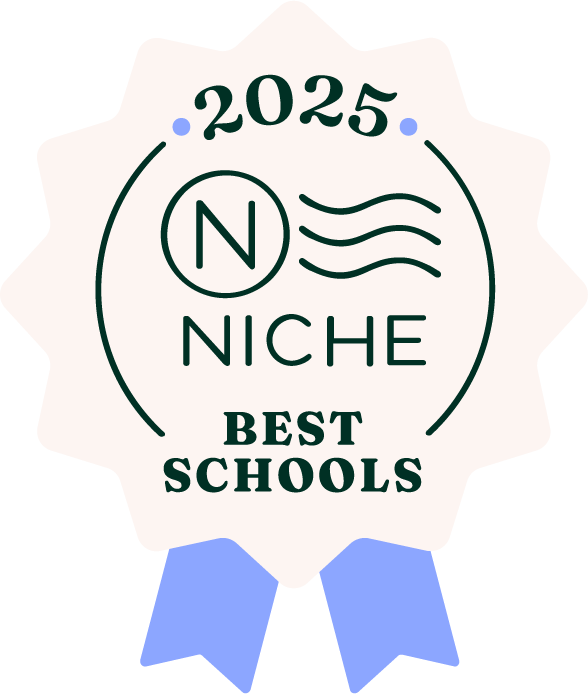Greensboro Montessori School’s Junior High program includes seventh, eighth and ninth grades focusing on applied academics and experiential learning tailored specifically for adolescent-aged students.
The Junior High years are characterized by significant growth and change cognitively, socially, emotionally and physiologically. Greensboro Montessori School’s Junior High program incorporates state educational guidelines; reflects current research being done on adolescent development and learning; and is based on Montessori principles such as multiage classrooms, personalized learning and integrated curriculum.
A core team of four full-time and three part-time teachers plans and implements a rigorous academic curriculum that is integrated thematically across all subject areas and provides a culmination to the early childhood and elementary Montessori classroom experience. The emphasis on interdisciplinary studies is heightened through regular work on small-team and individual research projects. Students are challenged according to their unique academic ability and are given the opportunity to advance at their own pace. On a regular basis, class time is devoted to helping students develop strong organizational, study and computer skills.

“The hand is in direct connection with man’s soul, and not only with the individual’s soul, but also with the different ways of life that men have adapted on the earth in different places and in different times. The skill of man’s hand is bound up with the development to his mind, and in the light of history we see it connected with the development of civilization. The hands of man express his thought, and from the time of his first appearance upon the earth, traces of handiwork also appear in the records of history.” – Maria Montessori
Montessori education for the adolescent binds the individual’s intellectual growth to her contributions and participation in a larger community. Therefore, in Junior High, parents will see these two types of work, with the head and the hands, interwoven in the context of community work (the running of our micro-society) and in the student’s challenging educational syllabus. Work with the head and hands is necessary for adult life. The adolescent is moving towards maturity and adulthood and the actualization of personality. She is discovering in what unique ways she can contribute to society. To this end, we follow Dr. Montessori’s Plan of study and Work. Purposeful work is full of intellectual study and helps abstract thoughts to crystallize, while intellectual work cannot be fully realized by the adolescent without practical application.
 
Project based learning (PBL) is an approach toward study and work that closely mirrors Montessori pedagogy. Through PBL work, students will apply agency and independence while working with team members toward worthy and valuable public products. Through research, experience, reflection, and the creation of a public product, students engage in PBL projects through multi-disciplinary study and real-world application of the skills and knowledge they are developing.

Following best practices from researchers at N.C. A&T, students drill holes into the logs.
The purpose of the Junior High mathematics program is to help the students develop an understanding, not only of the principles of mathematics and geometry, but also of the relevance and application of mathematics and geometry to their intellectual growth and their everyday lives, as well as as to society as a whole.
This three-year curriculum was developed using the latest research on how adolescents learn, as well as, recent scientific data. It inlcudes:
- The study of the Earth and living things which includes geology, biology, cosmology, botany, zoology, physiology, astronomy and comparative anatomy.
- The study of human progress and the building up of civilization which includes physics, chemistry, mechanics, engineering, and genetics.
- The study of the history of humanity which includes scientific discoveries and relation of humans to the environment.
The Humanities curriculum gives students a solid grounding in the conventions of the English language by incorporating grammar, writing, and literature with all other curricula. Students will read and be exposed to a variety of literature that is integrated with geography and historical inquiry with all other subject areas.
Spanish integrates listening, speaking, reading and writing skills. Instruction centers on the development of conversational skills with grammar structures and vocabulary being emphasized to enable proficiency in thematic topics. The culmination for Spanish Language acquisition is the eighth graders’ annual cultural immersion field trip to Costa Rica.
- Creative Labs – Performance and Production and Visual Arts: The Performance and Production (P&P) curriculum seeks to develop the student’s ability to create translate, produce, maintain, and further an original idea through the performing arts. The Visual Arts (VA) curriculum interweaves aspects of Montessori’s Five Great Lessons, concepts from across disciplines, and national standards for arts education.

- Music Ensemble: In addition to the required P&P and VA classes, student may also choose to participate in Music Ensemble. This School-sponsored band performs on and off campus throughout the year.
- Physical Education: The purpose of the Physical Education program is to help the students understand the value of being physically fit and the types of activities that contribute to total fitness.
- Careers: Students operate a micro-economy, which includes finance; management (student council), farming; culinary arts; research, design and production; and publishing (yearbook). Seventh grade students rotate through all careers in one year. Eighth and ninth grade students apply for jobs and specialize in one career for the duration of the year.
- Advisory Groups: Students meet daily with a faculty member in a small group setting where emotional and academic support and guidance is offered.
- Study Buddies: Students work in the classrooms of younger students to assist teachers and provide mentoring and role modeling opportunities.
- Transitions and Wellness: This three-year program, based on the work of Joseph Campbell, is designed to meet the needs of young people as they undergo major life changes to adulthood:
- A Brave New World addresses the transition from Upper Elementary to Junior High
- Heroic Journey addresses familial, societal and peer related pressures adolescents face
- Vision Quest addresses issues face as they transition to new schools and prepare for their lives as independent and responsible citizens.
“Men with hands and no head, and men with head and no hands are equally out of place in the modern community…Therefore, the work on the land is an introduction both to nature and civilization and gives a limitless field for scientific and historic studies…The rural atmosphere offers students a kind of ‘place apart’ – a safe and healthy environment to promote their transition to adulthood.” – Maria Montessori
Junior High students experience Greensboro Montessori School’s distinct Land Laboratory program. This land immersion program features students spending fours days, approximately every sixth week, on our 40-acre Land Campus in Oak Ridge. When the School began the program in 2004, students stayed in tents, but students, guided by faculty, have since designed and built their own structures to meet various needs. The Land Campus also includes a barn and conference center the School uses when it rains.
When living on the Land without electricity and other first-world conveniences, students develop a strong sense of community through planning and preparing meals, maintaining the environment, and working on small and large group projects… all this while experiencing a healthy and valuable change of pace.
In addition to numerous day-long field trips, junior high students participate in 5- to 10-day extended trips annually:
- Seventh graders travel to Tucson, AZ visiting sites pertaining to their studies of the Westward expansion.
- Eighth graders culminate their Spanish Language studies with a 10-day trip to Costa Rica where they visit wildlife preserves, volunteer at a turtle hatcher and zip line through the rain forest with students from Greensboro Montessori School’s sister school in San Jose.
- Ninth graders brainstorm, research, plan and execute their own field trip as a capstone experience to their cumulative time in Junior High.
Open participation in co-ed team sports within the Independent School League is another vital element to the Junior High program. Emphasis is placed on positive, cooperative team play. Junior High sports include volleyball, cross-country, basketball, flag football and soccer, but may differ from year to year as determined by the coaches of the participating independent schools.
- “I like that we have opportunities to explore and don’t have to follow a set path.”
- “I like how we can learn at our own pace and choose our own work.”
- “We are encouraged to challenge ourselves.”
- “The teachers are welcoming and understanding.”
- “Nothing is a lecture. It’s a discussion.”

“Today, I graduated college (Cum Laude, woo!) and am soon moving across the country to start my career ... Looking back, it wasn’t high school that prepared me to become the woman I am today, it was my time at Greensboro Montessori School.”
— Allie, Class of 2010
As a pilot heading into the airlines to y jets professionally, I give Greensboro Montessori School a ton of credit … My life wouldn’t be the same without the amazing environment, experiences, and wonderful faculty.”
— Steven, Class of 2003


